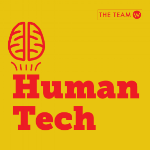I just finished listening to the March 31 podcast of Human Tech with their guest Nick Fine (@doctorfine) who was brought on to introduce an idea that shouldn't be radical. He reiterated for all of us that a user experience (UX) is a thing that we all have, it's definitely not something you "do", and above all, research is your ultimate key to success.
One of the main misconceptions companies, stakeholders, and even some self-proclaimed "UX Designers" have when they consider "designing a user experience" is that designing a UI based on all of the best principles and practices will give them what they think they need. I’d argue, can there even be such a thing as “superb” UI design if no in-depth user research was ever completed to validate the need for the UI to exist?
As with any good educational podcast, it left me wondering which skills path I fit best on, and which I’d benefit others by being on. If there is a plethora of new designers eager to get on the tools and mock stuff up, perhaps more of my research-leaning interests will help balance us all out.
I am without a doubt someone who will tirelessly try to introduce user-centric mindsets, processes, and tools to get companies and peers on the right path. However, in the day-to-day grind, I often find myself sucked into UI decision making for the front-end developers on what the buttons should look like, what should happen when this or that interactive element is used, what screens we're missing, and so on.
Whatever title this is, like Product Manager or UX, I’m never sure. But, knowing I’ll get us testing each of these decisions out with real people gives me the internal reassurance I need that whatever I am is providing value and reducing risk.
I am not a UI Designer and I never was; that I know for sure.
I can sketch up ideas to get conversations started, but I prefer it ends there. I would rather rely on someone else with a more visual mind to figure out how to best make the stories I tell come to life in a visual, tactile, and interactive way. I also not nearly as scientific in my probabilistic research as Nick Fine would like "user researchers" to be, but I like to believe that so long as my observational and testing processes are repeatable, then I’m on some kind of right track.
Due to this disparity in personally developed skill sets, I was anxious for a long time over just how much I was shooting myself in the career foot by not explicitly learning how to use Sketch, Axure, or any of the popular UI design tools. I rathered focus on how best to interview customers, tell their stories, and test out new designs. Talking with job recruiters will give you that worry, or at least they did for me.
The calm I’m finding in my research-centred career pathway comes from podcasts like the one above and simply getting down-in-the-dirt work experience. I know it’s what companies need more of, it’s easy to see, but—just like watching them painfully try to implement user story development—what they think they need might not be the best solution to their core problems. I’m not useless when given a set of InVision slides and asked to tweak them to get a testable idea across, but I know it’s not my realm to live in day in and day out.
Consider this like an experiment with my own life. I’ll play to my strengths, identify my skill weaknesses, and focus on close collaboration with others to set me apart.
“I get a lot of people asking me for the answers to things like I’m some guru or an oracle. But I haven’t worked on your brand. I don’t know your users. I don’t know your proposition or your product or your service. I don’t have all the answers, but I do have the methods to get you those answers. There’s no playbook [that I can just hand over like a Bible], but psychology has all the methods needed to find all the gold, all the magic to make it happen.”
If we do good things and don't forget to talk to our customers, we’ll all get there.


